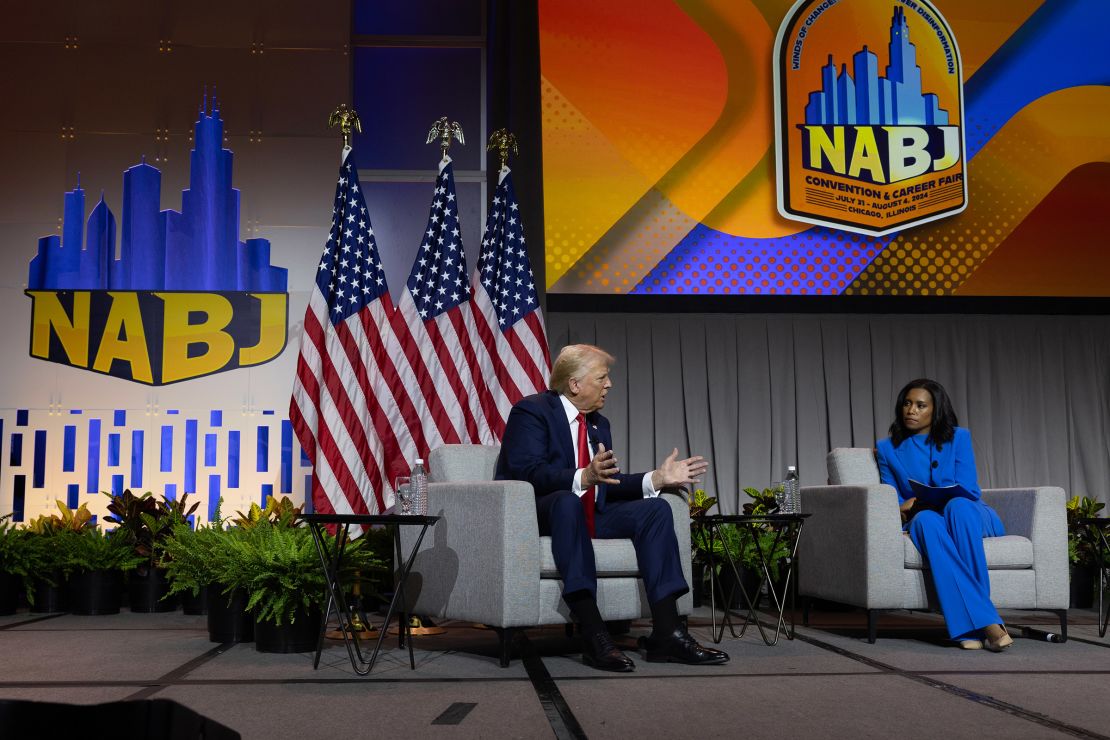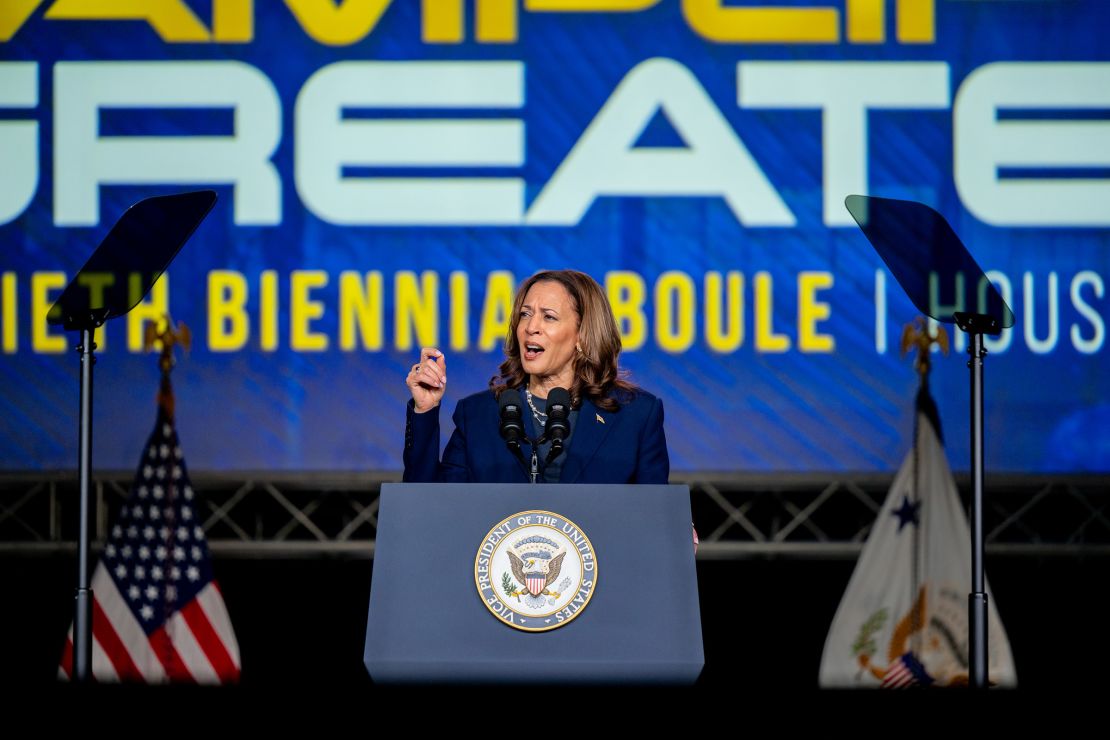A 17-day stretch with few parallels in American history has upended what looked to Donald Trump’s campaign like a clear path to victory when the former president stepped on the Republican convention stage in Milwaukee.
In that moment, a unified Republican Party had rallied around Trump after he survived an assassination attempt. His opponent, President Joe Biden, faced sagging poll numbers, sluggish fundraising and intraparty concerns over his own viability that were reaching a fever pitch.
And then the 2024 presidential race was turned on its head.
Trump went off-script and into attack mode in his Thursday night speech to close the GOP convention, delivering sharply partisan remarks that undercut the calls for unity that had preceded him. Three days later, Biden exited the race. By that Monday evening, Democrats had so quickly coalesced around Vice President Kamala Harris that she had effectively cemented the nomination – and was well on her way to shattering fundraising records.
Amid the newfound enthusiasm among Democrats, Trump’s campaign found itself grappling with unwelcome scrutiny over past comments his running mate, Ohio Sen. JD Vance, had made disparaging “childless cat ladies.”
At the same time, Trump’s campaign was struggling to find a consistent line of attack against Harris – a challenge that culminated with Trump’s appearance at the National Association of Black Journalists’ convention in Chicago on Wednesday.
The former president seemed to abandon any pretense of a disciplined message and ignited controversy by spouting falsehoods about Harris’ racial heritage, claiming that the vice president – the daughter of immigrants from India and Jamaica – now “wants to be known as Black” after years of “only promoting Indian heritage.” His campaign then dug in and repeated those false attacks.
Now, the 2024 race is in flux. Harris has erased Trump’s polling and fundraising advantage over Biden. The former president’s hopes of narrowing the Democratic advantage among Black and Latino voters are in question. And how voters will react to the Trump attacks reminiscent of 2016 is uncertain.
“There’s a shift in the race going on right now,” Trump campaign pollster John McLaughlin said Friday on CNN’s “Inside Politics.”
He said Trump “will win on the issues” but also seemed to acknowledge that attention had shifted far away from any policy contrast.
“What you want to talk about is different from what we want to talk about,” McLaughlin said. “And that’s fine, we’ll let the voters sort it out.”
The campaign whirlwind of the past two weeks has left Democrats who had been dejected suddenly feeling a fresh sense of optimism, while Republicans wonder whether the unity from weeks ago will return in the closing chapter of the race – and hope that Trump and his allies can refocus on what’s now a much different challenge.
“People need to stop talking about coups,” said a Republican consultant close to Trump’s campaign, urging the party to quit complaining about the process by which Democrats switched Biden for Harris. “We won that race, and now we have to suit back up and win another race.”
The wave of enthusiasm is apparent to loyal Democrats like Harper West of Oakland County, Michigan, who has been going door to door for months with lackluster levels of interest. All of that changed, she said, the moment Biden bowed out and endorsed Harris for president.
“I’ve been canvassing for about 50 years. We’ve never in my lifetime changed candidates this late in the game,” West said, pausing as she left a Harris campaign office to pick up a new packet of door-knocking materials. “There is a lot of excitement around Vice President Harris, actually. I’m not used to that. A lot of people are very fired up.”
For months, it felt to those around Trump as though he could not lose.
His fundraising numbers skyrocketed, surprising his advisers, after his felony conviction in New York. His legal woes elsewhere were aided by a scandal in the Georgia prosecutor’s office and a Supreme Court victory. And Biden, in a debate that occurred much earlier than usual, delivered a dismal performance.
Then, Trump’s ear was grazed in an assassination attempt at a rally in Butler, Pennsylvania, two days before the Republican convention was set to kick off.
Then, Biden called it quits, Democrats rallied around Harris, and Trump was thrust into a much different race.
Trump’s campaign had spent the past two years carefully crafting a playbook designed to go after an unpopular 81-year-old incumbent, including pouring tens of millions of dollars into data, modeling and ads aimed squarely at Biden.
Trump’s advisers have insisted that his campaign was ready for a potential change at the top of the ticket long before Biden officially dropped out, pointing to an internal memo from May laying out scenarios that would result in an open convention and another Democratic standard-bearer.
They have argued that they had begun preparing opposition research, with a focus on Harris, under the belief that the Democratic Party would not circumvent the first Black woman to be vice president. However, despite the preparations, Trump’s campaign has yet to find its footing on a consistent message about the vice president.
“We have to work hard to define her,” Trump said Saturday at a campaign rally in Atlanta. “I don’t even want to define her. I just want to say who she is. She’s a horror show. She’ll destroy our country.”
Trump’s advisers have privately acknowledged that they are still determining the best way to define his new opponent. Trump himself has test-driven a series of attacks during his rally speeches and interviews.
But he may not get the opportunity to lob those attacks in person. Harris has said she would participate in the September 10 debate hosted by ABC that Trump and Biden had agreed to. But the former president is instead pushing for one hosted by Fox News, writing Saturday that he would debate her September 4 on the Trump-friendly conservative network, “or I won’t see her at all.”
Harris, in turn, pointed to Trump’s commitment in May to the ABC debate.
“I’ll be there on September 10th, like he agreed to. I hope to see him there,” she said on social media Saturday.
Senior Trump advisers continue to suggest that a campaign against Harris would largely center on the same issues once used to criticize Biden: crime, immigration and inflation, arguing that the vice president played a key role in shaping the administration’s approaches to those topics.
Outside the campaign, Trump’s allies worry there is no strategy for what is now a competitive race.
“The campaign seems complacent,” one source close to Trump told CNN.
“There is no ground game that we can see – no media operation,” said another.
Multiple sources close to Trump told CNN that there were growing calls, both publicly and privately, among these outside allies for a campaign shake-up, citing in part the need for more original 2016 Trump loyalists to be involved.

Trump surprised allies and even some campaign staffers when he announced he would take the stage at the NABJ conference in Chicago. Trump himself, and his senior advisers, had signed off on the decision to participate in a panel discussion.
Trump’s campaign has long sought to make inroads with Black and Latino voters – hoping that marginal gains in GOP support from groups that have historically voted overwhelmingly for Democrats could prove decisive. However, with Harris replacing Biden, it’s no longer clear whether such gains are possible.
Still, for Trump, the NABJ conference was also an opportunity to reclaim media attention after a week in which Harris had dominated headlines. But it was a high-risk move that worried some allies.
“This event, more than anything he has done in months, has the most potential to go sideways,” a source close to Trump told CNN before the former president took the stage.
It did, immediately.
Trump launched into an attack on ABC News journalist Rachel Scott over her first question that noted his history of racist remarks, including pushing the “birther” conspiracy theory that former President Barack Obama was not born in the United States, and asked why Black voters should trust him. The discussion devolved from there, with Trump falsely accusing Harris of embracing or denying elements of her heritage for political gain.
“She was always of Indian heritage, and she was only promoting Indian heritage. I didn’t know she was Black until a number of years ago when she happened to turn Black and now she wants to be known as Black,” Trump said.
In addition to igniting controversy reminiscent of his 2016 campaign, Trump’s comments also undercut his campaign’s efforts to focus on Harris’ immigration record – which included a multimillion-dollar ad buy in six battleground states.
Prior to his NABJ remarks, Trump’s campaign had sought to distance itself from racially incendiary comments about Harris, including those from GOP lawmakers referring to the vice president as a “DEI hire” – the acronym for diversity, equity and inclusion.
“I don’t know if it’s off limits, but it’s not something that we’ve done. So, it’s not even on our radar,” campaign spokesperson Steven Cheung told reporters in North Carolina.
But by Wednesday afternoon, Trump and his campaign had doubled down on his attack on Harris’ racial heritage.
At a rally in Harrisburg, Pennsylvania, hours after the NABJ event, Trump’s team rotated past article headlines about Harris becoming the first Indian American senator on the Jumbotron. And the next day, Trump posted a photo of Harris in a sari.
The messaging made several Republicans who spoke to CNN uncomfortable – and many said they hoped it would not become a lasting part of the campaign’s talking points.
“He’s never going to back down now – he can’t admit he was wrong. You’re going to see them double, triple down now,” one source close to Trump said.

As Trump was taking the stage in Chicago, Harris was boarding Air Force Two for a flight to Houston. She had come directly from the White House, where she had lunch with Biden in the president’s private dining room. The quest to defeat Trump – now her fight – was one topic of their conversation, a White House official said.
While Harris didn’t see his full comments in real time, she watched news coverage of Trump’s appearance and began thinking about how she would respond that night. She agreed with advisers who argued against “taking Trump’s bait yet again,” in the words of one of them.
That night, when she addressed an adoring crowd of Black women gathered for the Sigma Gamma Rho sorority convention, she delivered a pointed, yet measured, response, dismissing his remarks as “the same old show: the divisiveness and the disrespect.”
Rev. Charles Williams, pastor of Historic King Solomon Baptist Church in Detroit, said the derisive comments about Harris’ race and qualifications would backfire on Republicans and rally supporters around the vice president.
“If they begin to target her because of her race, then that’s going to incite a base of people who are going to say, ‘Hey, wait a minute, I’m not going to stand for that,’” Williams said.
Many Republicans agreed. The consultant close to Trump’s campaign said it was a mistake for him to have veered off into an attack on Harris’ racial identity at the NABJ convention.
It happened, the person said, because the journalists’ questions “pissed him off, and he’s still Donald Trump.”
On Capitol Hill, many Republicans – including longtime Trump allies – were critical of the former president’s comments.
“I’ve known the vice president for a while. She’s always embraced her heritage proudly, as she should,” South Carolina Sen. Lindsey Graham said. “My problem with Vice President Harris is the policy choices she’s made.”

As Harris entered the weekend expected to soon make her choice of running mate, Trump’s campaign was eager to reverse what polls showed was a poor public perception of his ticket mate.
In choosing Vance as the Republican vice presidential nominee, Trump had tapped an ideological heir apparent: a former critic who spent years explaining, often on television, how he’d come around to the former president’s populist and isolationist brand.
But those interviews, many with conservative outlets, have also provided Democrats ample material to attack Vance. Most significant has been a 2021 appearance on Tucker Carlson’s former Fox News show in which Vance, then a Senate candidate, said that the United States was being run by “a bunch of childless cat ladies who are miserable at their own lives and the choices that they’ve made, and so they want to make the rest of the country miserable too.”
Democrats seized on that comment – with Harris’ campaign and many of her allies using it to brand the GOP ticket as “weird.” And while they remained publicly supportive of Vance, some Republicans on Capitol Hill refused to defend those remarks.
Alaska Sen. Lisa Murkowski, a moderate Republican, said Vance’s comments were “offensive to me as a woman.”
“Women make their own determinations as to whether or not they’re going to have children or cats or dogs or how many kids they’re going to have,” she said.
Trump’s campaign is eager to change the conversation around Vance, who traveled to the US-Mexico border in Arizona on Thursday in a visit aimed at shining a spotlight on Biden’s and Harris’ handling of border security.
Advisers to both Trump and Vance told CNN they are planning for the Ohio senator to have a far more active schedule moving forward, including more visits to battleground states, more fundraisers and more media interviews.
The Trump campaign also hopes to capitalize on the generational contrast Vance brings to the race – he turned 40 on Friday; Harris is 59 – by having him appear on longer-form podcasts and digital shows that target younger audiences.
But Vance’s main goal, the advisers said, is to be the campaign’s disciplined policy messenger – maintaining more focus than Trump, who regularly veers off script. The aim is for Vance to criticize Harris’ record as California attorney general and cast her as the Biden administration’s “border czar.”
Yet on Thursday in Arizona, Vance found himself defending Trump’s false attack on Harris.
“Look, all he said is that Kamala Harris is a chameleon,” the Ohio senator told CNN in an interview.
“She is everything to everybody, and she pretends to be somebody different depending on which audience she is in front of,” he said. “I think it’s totally reasonable for the president to call that out, and that’s all he did.”
CNN’s Fredreka Schouten, Kate Sullivan, Jeff Zeleny, Steve Contorno, Manu Raju, Morgan Rimmer, Danya Gainor and Lauren Fox contributed to this report.















